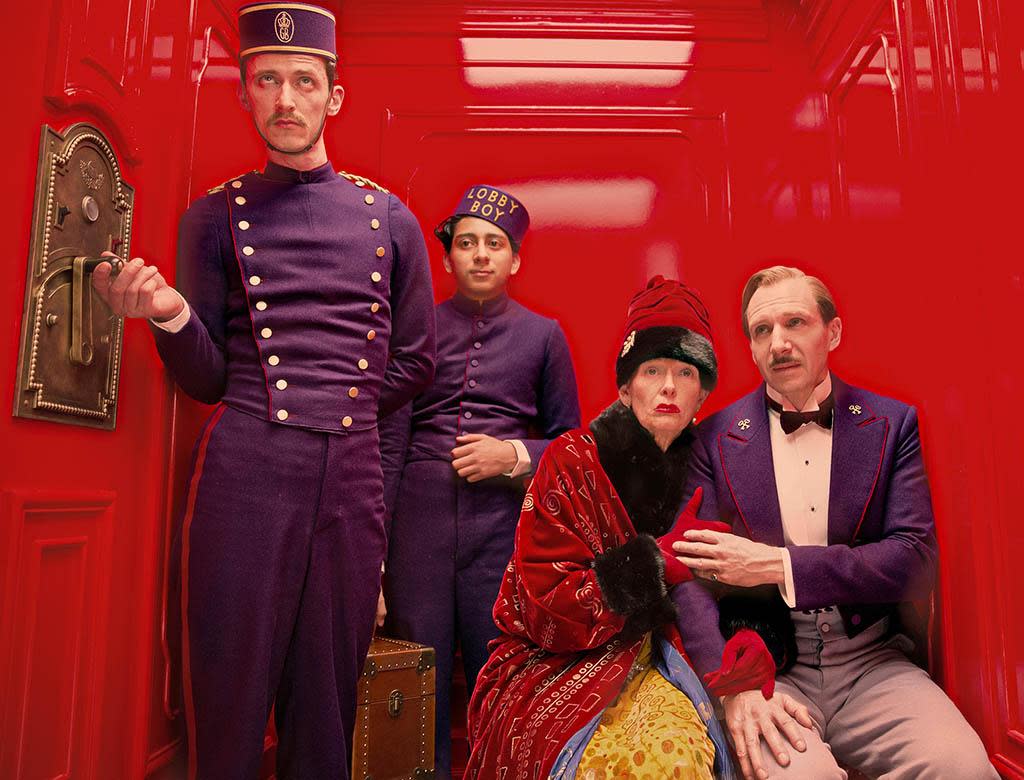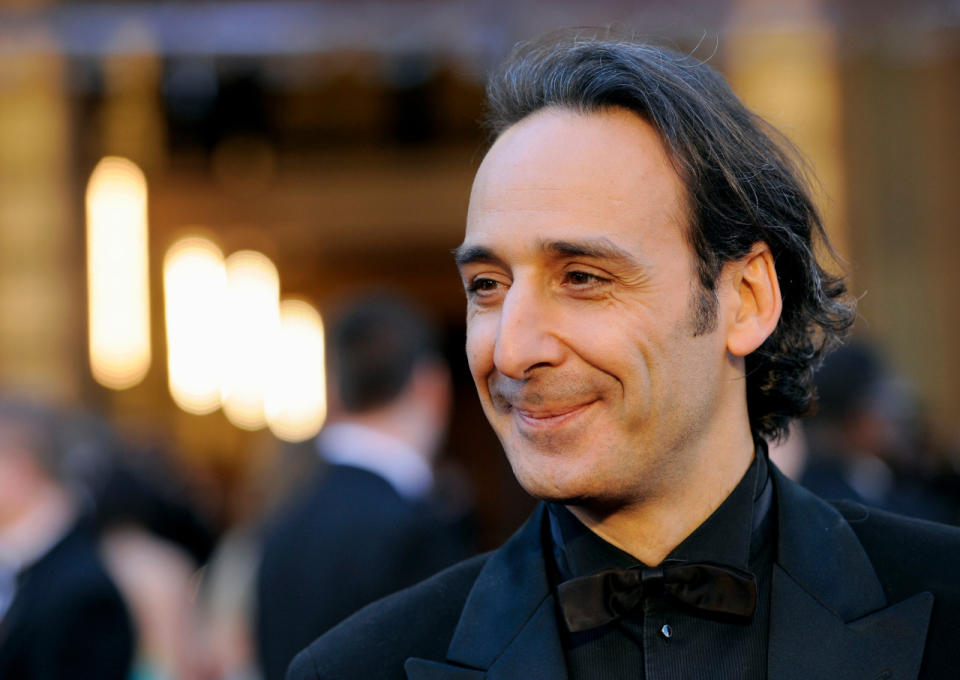Composer Alexandre Desplat on His 8 Oscar-Nominated Movie Scores

Desplat earned one of two Oscar nods for The Grand Budapest Hotel
This year, Alexandre Desplat received a double Oscar nomination for Best Original Score, a rare honor he shares with such legendary film composers as John Williams (Star Wars) and Bernard Herrmann (Psycho). His accolades don’t start there though: His Academy Award nominations for The Imitation Game and The Grand Budapest Hotel are his seventh and eight, respectively, since 2007. A remarkably versatile composer who began his career in the French theater, Desplat, 53, has created dazzling scores for massive blockbusters and independent films alike, including Harry Potter and the Deathly Hallows, The King’s Speech, The Twilight Saga: New Moon, Moonrise Kingdom, Julie & Julia, The Queen, Argo, and Zero Dark Thirty, to name just a few. With Oscar night approaching on Feb. 22, Desplat spoke with Yahoo Movies about the inspiration behind his eight Academy Award-nominated scores.

Alexandre Desplat at the 2011 Oscars
The Imitation Game (2014)
Desplat’s score for The Imitation Game takes the audience inside the brain of pioneering computer scientist Alan Turing (Benedict Cumberbatch), who devised a machine to decode Nazi communications during World War II. “The way the very fast mind of a genius can work, the music can break it out and capture that and bring it to the audience,” says Desplat. “By using computerized arpeggios and scales, it allowed me to make the audience feel that there was something special about this man and about his mind, that he goes faster than anyone around him. So there is a little electronic [in the music], but it’s not in your face.”
The Grand Budapest Hotel (2014)
Director Wes Anderson’s early films were known for their eclectic pop soundtracks, but each of his collaborations with Desplat — Fantastic Mr. Fox, Moonrise Kingdom, and The Grand Budapest Hotel — have incorporated progressively more original instrumental music. This Best Picture nominee, a madcap fable about a hotelier and his protégé, is the first Anderson film to be scored all the way through.
Desplat’s music was guided by both The Grand Budapest Hotel’s shifting time periods (for instance, he used an electric organ to signify the 1970s) and its geographic setting, the fictional Alpine country of Zubrowka. “The fact that it’s in a land that goes from Switzerland to somewhere into east of Europe influenced the way we decided to create the orchestra: Instead of having a string orchestra, we have a balalaika orchestra. Instead of a piano and harp, we have cimbalom and zither,” says Desplat. The score was also inspired by traditional Romani music. “You can play sad when the picture is sad, but the same music under the happy moments sounds happy,” he explains. “There’s always a soupçon of melancholia.”
Philomena (2013)
Written for one of Desplat’s frequent collaborators, director Stephen Frears, the score for Philomena personifies the title character (Judi Dench), an elderly Irish Catholic woman searching for the son she was forced to give up for adoption. “I thought that the music should be her music, something which is simple, but not simplistic,” says Desplat. “If you put your hand on the piano, and you don’t move the arm, you can play the melody just with five fingers.” Desplat incorporated violin harmonics (the highest tones of the instrument), which he describes as “a pure sound, almost like a crystal glass that you play with, because she has a very pure soul.”
Argo (2012)
The suspenseful score for Argo, Ben Affleck’s Best Picture winner, follows the arc of the film as CIA agent Tony Mendez (Affleck) plans and executes his daring Iranian rescue mission. “That was the first time I was able to do a score which had two sections: the first section [in the U.S.] which would be Occidental, and the second section [in the Middle East] that would be mostly Oriental,” Desplat explains. “So the second they enter the Iranian air space, you hear the great voice of [Iranian singer] Sussan Deyhim — like if the characters were going on another planet suddenly, with sounds they wouldn’t be used to.”
The King’s Speech (2010)
Like The Imitation Game, Tom Hooper’s drama follows the journey of a historical figure who struggles to communicate his thoughts and feelings. In this case, that man is King George VI (Colin Firth), who has to deliver a wartime radio address despite a debilitating stutter. “The man that cannot express his emotions — I love doing that, because the music can really convey what a man cannot say or doesn’t want to say,” says Desplat. “So the music is actually built on a theme that cannot unfold. It’s just one note repeated. And at the end of the film, this thing finally takes shape when the king can finally express himself.” Remarkably, the score was recorded using a microphone built for King George himself, discovered in the archive of EMI.
Fantastic Mr. Fox (2009)
As Desplat observes, many animated children’s features are scored using a full orchestra — which he felt would overwhelm director Wes Anderson’s delicate stop-motion characters in Fantastic Mr. Fox. “I suggested to Wes that maybe we could try and create a mini-orchestra with mini-instruments,” he recalls. “We had a glockenspiel, a mandolin, a banjo, recorders — so it’s like if the little puppets were playing the score.”
The Curious Case of Benjamin Button (2008)
David Fincher’s romantic drama spans the better part of a century, with Brad Pitt playing a man who ages in reverse and Cate Blanchett playing the love of his life. Given the film’s New Orleans setting and sweeping view of American history, Desplat wanted his score to represent “what jazz music has brought to American music, but without being literal.” The composer created a classical score for Benjamin Button, but assembled his orchestra with jazz instruments: saxophones instead of French horns, for example, and electric guitar in the string section. “Just by using these sounds, it created a strange color that I think gave a great sense of melancholia to the film,” he says.
The Queen (2006)
“When I saw the film, I thought it would need no score because the film was so good,” Desplat recalls with a laugh, “and Stephen [Frears] had to insist.” In approaching the music for The Queen, his first film with Frears, Desplat says he “wanted to bring a sense of royalty”— but from a French perspective. “We think of royalty with irony or humor, because we chopped the heads off our kings and queens long ago.” To create a majestic score that didn’t get bogged down with self-importance, Desplat incorporated the baroque sounds of harpsichord and mandolin, but also “some cheesy programmed synthesizers” to represent Princess Diana’s height of fame in the 1980s.
Related: Oscar Nominee Diane Warren on Her 7 Biggest Movie Songs
Image credits: AP Photo/Chris Pizzello, Fox Searchlight

